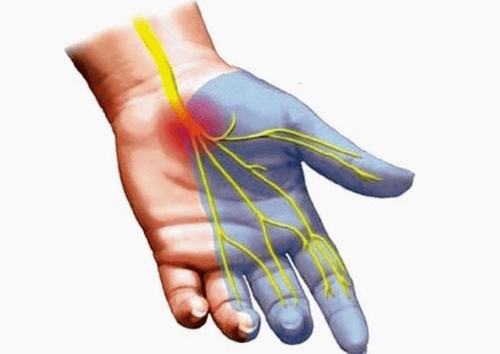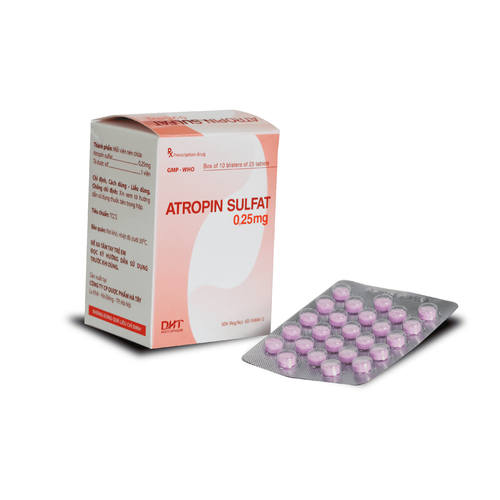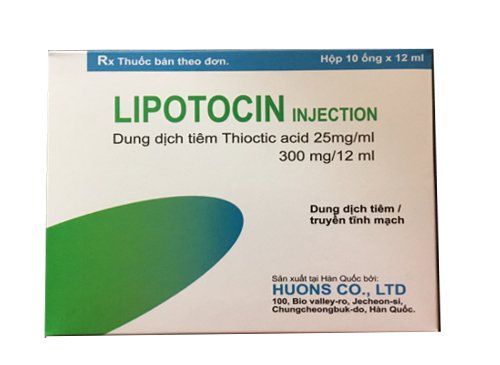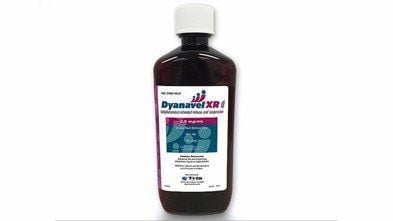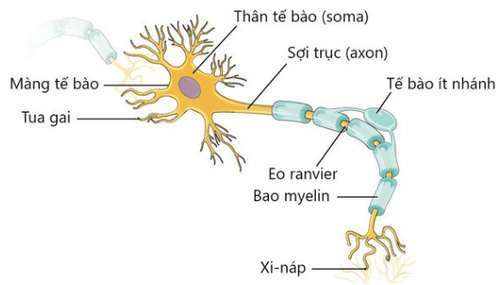This is an automatically translated article.
The human nervous system includes the central nervous system (including the brain and spinal cord) and the peripheral nervous system, which governs sensory, motor and vegetative functions. When the nervous system is damaged, it will cause diseases that the nervous system governs.
1. Definition
Peripheral neuropathy is a disease that occurs due to damage to the peripheral nerves. Peripheral nerves, the nerves that help transmit signals from the brain and spinal cord to target organs, are fragile and easily damaged. Therefore, when damaged, it will disrupt the ability of the brain to exchange information with muscles and other organs.
Neuropathy occurs as a result of trauma, infection, metabolic disease, genetics, or exposure to toxic chemicals. These causes cause damage to the peripheral nerves, depending on the damaged nerve, there will be sensory, motor or vegetative disorders.
The most common clinical presentation is sensory disturbances such as numbness and pain in the arms and legs. However, depending on the damaged nerve will have different pathological manifestations.
Trắc nghiệm: Bận rộn có ảnh hưởng đến sức khỏe của bạn không?
Cuộc sống hiện đại khiến chúng ta vì quá bận rộn mà quên chăm sóc sức khỏe cho chính mình. Ai cũng biết rằng lịch trình làm việc cả ngày có thể khiến bạn kiệt sức, nhưng cụ thể bận rộn ảnh hưởng thế nào tới sức khỏe? Hãy cùng làm thử bài trắc nghiệm dưới đây.
2. Cause
Peripheral neuropathy is the destruction of nerves caused by various causes. Common causes:
Trauma or compression on nerves: Mechanical injuries such as traffic accidents, falls, sports injuries can all damage nerves to varying degrees. or repeated micro-injuries can also damage nerves such as crutches, prolonged sitting posture, typing on a computer or using a mobile phone,... Diabetes is a disease. Endocrine disorders often have complications of polyneuritis, the disease is often silent and difficult to detect. Autoimmune diseases such as lupus erythematosus, rheumatoid arthritis, Guilain-Barre syndrome, chronic inflammatory demyelinating polyneuropathy,... Infections: Including bacterial or viral infections such as shingles ,hepatitis C, Diphtheria, HIV,... Alcoholism: Vitamins are essential for maintaining the functioning of the nervous system. In alcoholics these vitamins will be deficient due to inadequate diet. guaranteed. Medicines: Certain drugs, especially cancer drugs (chemotherapy) can cause neuropathy Exposure to toxic substances:
Genetics: Like Charcot-Merie-Tooth disease Vitamin deficiency: Lack of vitamins B vitamins such as B1, B6, B12, vitamin E and niacin can cause neuropathy Other conditions: Such as bone marrow diseases, compression tumors, kidney and liver diseases, connective tissue diseases Thyroid dysfunction can all cause peripheral neuropathy. In some cases of unknown cause, it is also called primary idiopathic.
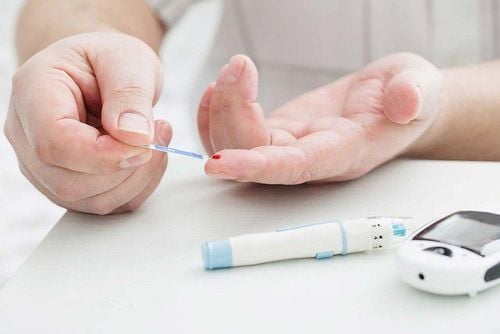
3. Signs and symptoms of peripheral neuropathy
Each nerve will take on a different function, depending on which nerve is damaged, there will be clinical manifestations of that nerve. Common clinical symptoms are:
Sensory nerves (pain and numbness) One of the most commonly reported signs by patients is numbness or burning pain in the arms and legs, which is one of the early signs of nerve damage. These sensations usually start in your toes and feet. You may have pain, usually in the feet and legs. This loss of sensation will make you not feel hot or cold when in contact with objects or the environment, do not feel pain when stepping on sharp objects, and cannot control the balance of your feet. motor (muscle activity) Nerve damage can make it difficult to control muscles and cause muscle weakness. Then your ability to grip and walk will not be good when you move your body or a body part. Sometimes your muscles will twitch or spasm and there may be muscle atrophy
Autonomic nervous system (autonomic nervous system): Regulates functions such as blood pressure, heart rate, digestion or urination. You may feel full and have heartburn even though you've only eaten a small amount of food, or you may feel light-headed or faint when you stand up. Angina is a warning sign of heart disease and a heart attack.
Other Symptoms : Sex: Men may experience erectile dysfunction and women may have trouble with vaginal dryness or difficulty reaching orgasm.
Bladder: you may leak urine. You may lose the urge to urinate.
The disease can damage 1, 2 or more nerves, so in clinical practice, many of the above symptoms can be experienced at the same time. You should see your doctor right away if you experience any of these symptoms.
4. Diagnosis
Peripheral neuritis is caused by many causes, so the doctor needs to focus on many factors such as:
Asking the medical history: The doctor needs to ask about the medical history and history carefully such as lifestyle, Toxic substance exposure, alcohol use habits and neurological diseases of the patient's relatives Nervous system examination: assessment of motor, sensory or autonomic nervous system function Auxiliary tests: Blood tests: check vitamin levels, blood sugar, thyroid gland, liver function, kidney and immune system abnormalities, .. Image: like CT or MRI scan to detect abnormal diseases causing electrical compression muscle: record neuromuscular signaling activity Nerve biopsy, skin biopsy: take a small sample of nerve fiber or skin to check for abnormalities
5. Treatment
The goal of treatment is to treat the underlying cause of the peripheral neuropathy and relieve symptoms such as pain. There are many medications that are used to relieve the pain of peripheral neuropathy.
Drug treatment: in addition to the drugs used to treat the disease and the cause, it is necessary to use additional symptom-reducing drugs on the patient, including:
Painkillers: used to relieve pain in the patient such as anti-inflammatory drugs, drugs should be used according to the doctor's prescription to ensure that they are not abused and cause side effects on the patient Anticonvulsants: to relieve nerve pain Antidepressants: used to relief of painful muscles in people with diabetic peripheral neuropathy Pain relief patch to the skin Surgical: Used to release compression in patients with compression peripheral neuropathy such as tumors, herniated disc,... However, the surgery needs to be carefully considered and evaluated by professional doctors.
Lifestyle changes:
Stop smoking, alcohol affects the blood circulation system and worsens the disease, good control of blood sugar to ensure that blood sugar is below the allowable threshold, for patients with diabetes. Diabetics need to take good care of their feet to avoid complications that cause ulcers and gangrene. Exercise regularly to improve health and help reduce nerve pain. Eat in moderation, enough nutrients to ensure ensure that the body does not lack trace minerals and vitamins that cause disease
6. Complications
Peripheral neuropathy, if not treated promptly and properly, can cause the following complications:
Skin damage: Due to the patient's loss of temperature or pain sensation, it may lead to burns . Infection: The sites of loss of sensation due to peripheral nerve damage are often overlooked, leading to infection. Falling: Weakness and loss of sensation can cause loss of balance and falls.
7. Prevention
In order to prevent disease, it is necessary to solve 2 factors that are good treatment of underlying diseases such as diabetes, rheumatoid arthritis, ... and positive lifestyle changes such as:
Ensure a nutritious, special diet especially B vitamins, niacin... Exercise regularly. Avoid repeated bad postures that compress nerve fibers, avoid exposure to toxic substances. Do not use alcohol or stimulants. The above is an overview of the disorders caused by the peripheral nerves, to better understand the disease or need examination and advice when you notice the symptoms of the disease appear, you need to see a team of specialists. for early advice and treatment.
If you have unusual symptoms, you should be examined and consulted with a specialist.
Please dial HOTLINE for more information or register for an appointment HERE. Download MyVinmec app to make appointments faster and to manage your bookings easily.




